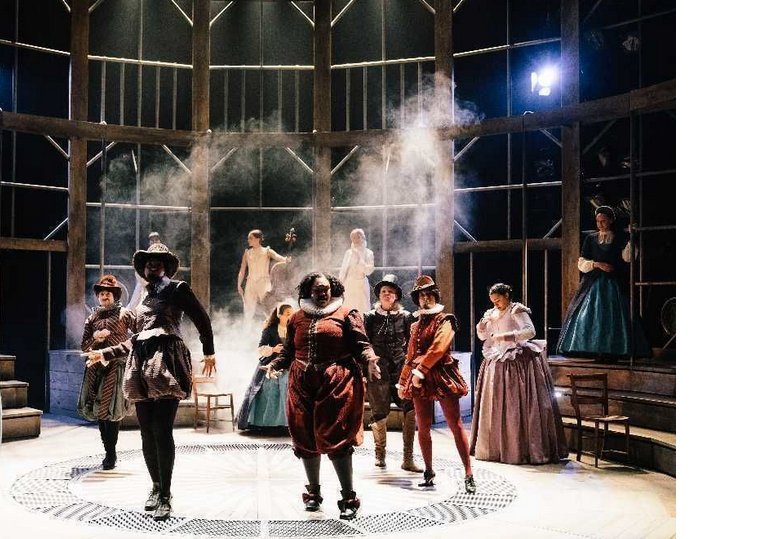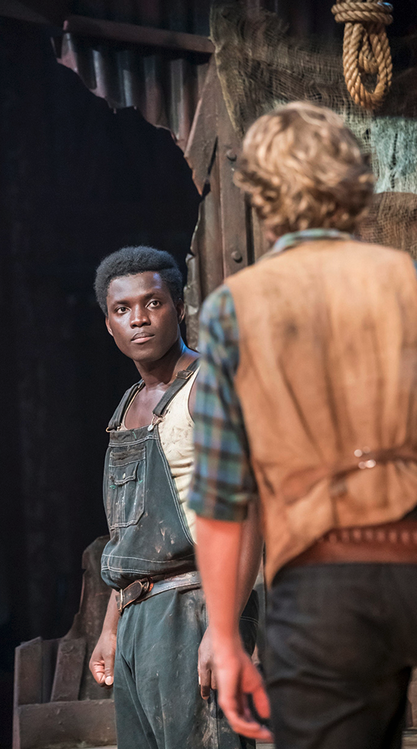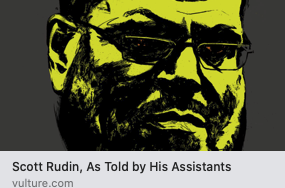The theatre shutdown is giving people an opportunity to reflect on the sort of theatre they want to see in the future; but for many, nothing short of a total revolution is in order.
At the end of Morgan Lloyd Malcolm’s Emilia, there’s a rallying cry: “If they try to burn you, may your fire be stronger than theirs so you can burn the whole fucking house down”.

n my review of that production’s transfer to the Vaudeville Theatre in March 2019 for LondonTheatre, I wrote, “The Vaudeville, built in 1870, is about to celebrate its 150th birthday. I hope no one takes that statement literally and it survives to do so.”
But burning the whole fucking house down is exactly what some seem to be calling for right now, doing what the Coronavirus very nearly accomplished on its own, but demanding new ways forward if and when the theatre finally re-opens. In a piece in The Stage this week that was headlined “In 2021, theatre has a chance to cement the revolution begun in the 1960s”, Lyn Gardner argued that now was perhaps the moment to do exactly that: burn the house down, and rebuild it in new and potentially more equitable ways:
“Theatre feels essential to you and me, but it doesn’t to most of the population. We need to acknowledge that, and question how we change that, and that means asking what role theatre has to play in supporting communities wanting to transform themselves and their lives./ Sometimes it needs a particular group of factors to come together to create change. I wonder whether we might be facing one of those moments now, driven by the inequalities that the pandemic has thrown up, and the events of the past year such as the deaths of George Floyd and Sarah Everard, the disquiet around Oliver Dowden’s heritage summit and the potential diminishing of the arms-length principle of arts funding.”
Meanwhile, The Stage have just published a detailed account of everything that’s wrong and racist about British theatre criticism over the years. According to the stand-first to Naomi Obeng’s long read feature,
“White male viewpoints have long dominated theatre history, presenting racist and damaging narratives of actors of colour and shaping the theatrical canon to ignore certain performers and productions. In 2021, while there are a few more critics of colour, the industry is yet to examine this reviewing legacy – has criticism really changed enough?”
Though very little actual supporting evidence is presented for this contention — there’s a quote or two from Lloyd Evans (a sort of parody critic on The Spectator) and Quentin Letts (ditto, a joke figure as a critic on the Daily Mail and now Sunday Times), but elsewhere it reaches into the remote past, with quotes from the long-retired Irving Wardle and Martin Hoyle (once a second stringer on the FT, again a long time ago), to support its arguments.
The Stage’s own reviews editor Natasha Tripney writes of systematic problems, without acknowledging that they actually also originate in her own editorial offices and under her own auspices. She writes,
“While there are people of colour working within The Stage’s editorial department and the broader company, there are none among the senior commissioning editors, (of which there are three, including myself, plus the editor) – a situation that is far from uncommon in the industry.”
But where are these people of colour in the editorial department?
None of them are on the actual staff list; she is presumably including freelancers. Whom she reveals are paid £25-£90 for reviews (rates unchanged since I worked for The Stage over two years ago). But it is actually disingenuous to cite that range: the vast majority of reviews are commissioned at 250 words (for £25), with a handful at 450 words (for £45) and, very rarely, longer reviews at 800 words (for £90). But the latter are almost invariably taken by Tripney herself or her joint lead critic Tim Bano (who is a freelance).
In another piece by Angelo Irving, in which he discusses the issues around bringing on more voices of colour to the world of criticism in discussion with Lyn Gardner and Ava Wong Davies, the latter points out,
“The answer is not more diverse critics because what the fuck does that mean? More diverse critics and then they go where? More diverse critics writing for £25 an article. Is that going to change anything?” And there’s the rub: at those rates, who can afford to be a critic anymore?
As Irving writes, “I would love to be a critic for the foreseeable future but the truth is, like many Black critics before me, I can’t afford to be.” But this is not actually a black and white, or even a black vs white, issue: very few people can afford to be a critic nowadays. It means that criticism becomes siloed into those few lucky voices who ARE still being paid a living wage via a rare staff job, and a bunch of hobbyists who do it on the side for little or no money at all, regarding the free ticket as their payment, while actually earning a living doing something else.
But The Stage of course is one of the perpetuators of the system of those low review rates, which given that the time seeing the show and writing the review should be reflected in what is paid as you can’t do one without the other, means that they are paying considerably less than the minimum wage.
And if it is looking at future change, then maybe Tripney and her editor could ask themselves why the black critics they send to shows are almost always sent only to review shows that have black content or predominant cast. (Of six reviews that Angelo Irving has been assigned to review so far, four of them fall into this category).

Actor Emmanuel Kojo, who guest-edits the section with Obeng, writes his own column and refers to a review in The Stage itself of a performance of his when he played Jud Fry in a Chichester Festival Theatre production of Oklahoma! in 2019, which was headlined “Problematic Undercurrents”.
In that review, Bella Todd writes,
“The body of Jud – the show’s outsider and therefore, in a non-revisionist staging, its villain – has scarcely been cleared away before the rest of the cast is singing buoyantly about the beauty of belonging.
“This is all rendered even more problematic by the casting of Emmanuel Kojo, a black actor, as Jud – the surly farm hand who lives in a dark smokehouse decorated with pornographic postcards, and frightens Laurey by ‘talking wild’.
The production feels unresponsive to the racial tension its apparently colour-blind casting evokes. Stereotypes of black masculinity are ignited without being interrogated – in the ‘dream ballet’, the costume design for which contrasts virginal white and raunchy black, Jud ravishes Laurey before pushing Curly into the pit in a burst of hellish flames. The spectre of lynching hovers around Jud’s death, yet the direction assuages Curly and his community of responsibility as rapidly as the kangaroo court.”
As Kojo comments:
“I don’t mind being criticised for my craft or performance – I welcome it. But when it is about something I have no control over and cannot change, like the colour of my skin, then that is something I justly get angry over. Now, whether one is aware of their inherent racism or unconscious bias is one thing, but the editors read and approved the review before it went to print.”
The editor where that particular buck stopped was Tripney herself. Yet she allowed this to pass.
If you’re going to burn the house down, perhaps it might be a good idea to start at home. And that’s one of the lessons I’ve learnt myself in 12-step recovery. I’ve been cleaning my side of the street, and owning my own culpability in harms I’ve caused. (I’ve even privately made an amends to The Stage’s editor myself for my own part in the events that led to my departure from my role as contributing editor there just over two years ago).

And as we’ve seen with the revelations of bullying by Broadway mega-producer Scott Rudin, undermining of people’s abilities comes in many forms, from throwing steaming baked potatoes and glasses at them to smashing computer screens on their hands. But it can also occur in subtler ways.
I’ve tried to address this with the editor and publisher of The Stage, both before I left and more recently. But the publisher has responded merely by gaslighting me further, as I’ve previously noted here, saying that they see the events differently. No doubt Scott Rudin would claim the same defence regarding his behaviour to HIS staff.
And now the public bullying and shaming of critics is coming from even beyond our own (former) employers. Yesterday Equity published “guidelines” for theatre critics to check their privilege and entitlement, urging them (according to a report in The Guardian) “to guard against unconscious bias and also consciously consider the relevance of race or ethnicity in their reviews”.
Furthermore,
The guidance urges critics to keep in mind that “true objectivity does not exist, so their reviews will always be influenced by their own lived experience”.
They should consider their own potential for bias and relative privilege when evaluating a production, and also consider whether they are best positioned to interpret a story. Writers are also urged to remember that everyone is equal and should not be treated as “strange” or “othered”, and approach unfamiliar themes, contexts and stories with curiosity and openness.
It simply beggars belief that Equity UK should now be addressing theatre critics in this way, telling us how to do our jobs. But then I suppose that some critics are fond of telling actors and creatives how to do theirs, like the aforementioned review of Oklahoma! in The Stage, so maybe we had it coming.
